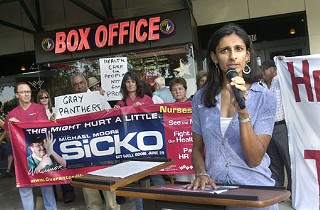Point Austin: Getting Wello
Join the fight for universal health care
By Michael King, Fri., July 6, 2007

Everyone has a personal lunatic U.S. health-care story.
My current favorite involves my 80-year-old mother, who was recently in the hospital for major abdominal surgery. As she recuperated – waiting impatiently for her recalcitrant blood pressure to subside sufficiently for the doctors to release her – a hospital accountant suddenly appeared, pressing her and her 90-year-old roommate (heart trouble) to "settle their bills immediately" before they were discharged. Needless to say, my mother's blood pressure skyrocketed, and the doctors could thank the accounting department for yet another day of unanticipated expense.
In the euphemistic argot of the U.S. health-care system, my mother is "fully covered" by Medicare and other insurance. That's the nasty paradox explored in Michael Moore's engaging and enraging new film, Sicko, which premiered last Friday in Austin. The Regal Arbor Cinema event was accompanied by a doughty phalanx of nurses and other health-care activists using the film as a springboard for a national organizing campaign in support of universal health care. As Moore's film effectively dramatizes, via a series of personal nightmares, what is called "health insurance" in America might better be described as high-stakes gambling, with the patient buying into the life-or-death risk and the insurance companies reaping the rewards – along with the ample cut duly accorded to politicians, public-relations specialists, and media whores.
At the bottom of the system are the 50 million or so uninsured people (e.g., fully 25% of Texans, mostly working people and their children) who flood emergency rooms and consequently drive up hospital costs but have the salutary disciplinary effect on the rest of us – don't change jobs or make waves, lest you end up like your unluckier neighbors. But even for those with insurance, it's a crapshoot – always partly uncovered, with a maze of intentionally arcane exceptions, and the constant threat of "exclusion" should you file too many or the wrong claims, like the poor woman interviewed by Moore who failed to have her insurers "authorize" her "out-of-network" ambulance trip to the hospital, because as it happened, she was unconscious from an automobile accident at the time. Shameless lack of foresight.
As one former insurance functionary, whose grim task was to find ways to exclude people from coverage after-the-fact and retrieve funds the company had already spent, puts it: "You didn't 'fall through the cracks.' Somebody made that crack and then swept you toward it."
The Neighbors Manage
Sicko is an earnest, effective, if somewhat unnuanced argument for a single-payer system (i.e., national health care along Canadian, British, French, or even Cuban lines – take your pick) and is both less polemical and more affable than Moore's earlier, more didactic documentaries. Despite decades of right-wing corporate propaganda to the contrary – some of it, stretching back to Ronald Reagan's festering beginnings, represented in the film – most Americans say they would prefer single-payer, universal coverage, even if it means higher taxes (which it would, along with shrinking "premiums"). The problem has been to create sufficient public pressure to enable such a change. Advocates are hoping that the film will be a fertile seed for that movement.
Austin Dr. Amina Haji attended the premiere on behalf of Health Care for All Texas, an advocacy group including many medical professionals that wants to "catch the impact" of Moore's film to generate local support for a single-payer system. She pointed to the state introduction of El Paso Sen. Eliot Shapleigh's Senate Bill 991 (it didn't garner a committee hearing) and U.S. Rep. John Conyers Jr. House Resolution 676 (co-sponsored by a fairly dismal 75 House members) as opening the door to eventual incarnation of what is sometimes called "Medicare for All." Since the road from the current, haphazardly privatized system to universal coverage/single-payer is not exactly clear, I asked Haji why advocates are insisting single-payer is the only way to go.

"We think it's the only way to provide equitable, comprehensive, efficient health care for everybody," she replied. "The other solutions are piecemeal attempts to fill in the gaps and therefore not equitable and not comprehensive."
With the presidential campaign already in full swing, health-care plans are flying across the Web, and many more are taking shape in Congress. But since the spectacular 1993 meltdown under pressure of first lady Hillary Clinton's health-care task force, single-payer has become a political third rail – policy wonks insist that in the U.S. it would simply cost too much to make the shift. Responds Haji, "Those who say that are ignoring all the overhead costs of the current system that would be eliminated under single-payer. There was just a study published in The New England Journal of Medicine that calculated we could save $350 billion with single-payer."
Moore has a lot of fun with the Cost Hysteria that drives so much opposition to single-payer, noting in the first place that the layers of competing bureaucratic expense associated with private insurance companies dwarf those of related federal programs (e.g., Medicare). Moreover, other industrialized nations with economies supposedly less robust than the U.S. afford universal coverage quite nicely, thank you; and if that isn't proof enough, the impoverished, embargoed nation of Cuba still manages to underwrite basic health care for every single one of its citizens, with better average health outcomes than the Northern Behemoth.
Whatever one may think of Cuba and its government – I'll leave that argument entirely aside for the moment – if the Cubans can afford universal health care, so can we.
It's a Choice
Coverage and health insurance are not the only crises of the American health-care system, but the ones most visible to all of us. Also among the fans of Sicko were members of the National Nurses Organizing Committee-Texas, the latest offshoot of the enormously successful California NNOC, which faced down Governator Arnold Schwarzenegger when he tried to enforce new nurse-patient ratios that would have overburdened nurses and endangered patients. Several Austin nurses – who preferred not to be identified by name for fear of reprisals from their bosses – said that nurse-patient ratios in Texas hospitals are out of control, with sometimes as many as 12 critical-care patients to one nurse. "We're being forced to choose between trying to care for patients badly," said one nurse, "or defying our bosses and saying, 'It can't be done this way.'"
If for no other reason, nurses need a union so they can speak freely about their own job conditions without fear of retaliation. And that's the sort of problem, like many others in the health-care system, that is not going to be solved directly by a single-payer system. There will be many other bumps along the way. But the most essential difference between what we have now and what we need is the difference between a system based on people's needs and a system based on private profit. We don't "privatize" public safety; whether fire or police protection, we pay for it in common. Why should health care be any different?
Moore found a priceless bit of archival film from the Nixon administration, when aide John Erlichman is reassuring his boss that Kaiser Permanente and HMOs are the way to go, because "the less health care they provide, the more money they make." That's the system we've got right now – structurally rewarding private providers for not providing health care. Under that system, is it any wonder that Los Angeles hospitals were dumping disoriented, indigent patients on the street?
If anything positive at all can derive from the Bush administration's colossally wasteful imperial folly in Iraq, it should at least put an end, once and for all, to the pernicious, calculated lie that the U.S. "can't afford" national health care. If we can afford international megalomania, we can afford to take care of one another, for a relative pittance. In England, Moore interviews Old Labour warhorse Tony Benn, who points to the creation of the National Health Service in England's poorest modern days, immediately after World War II. Benn puts it even more simply: "If we can find money to kill people, we can find money to help people."
Amen. ![]()
For more on the movement for universal health care, see www.healthcareforalltexas.org.
Got something to say on the subject? Send a letter to the editor.










